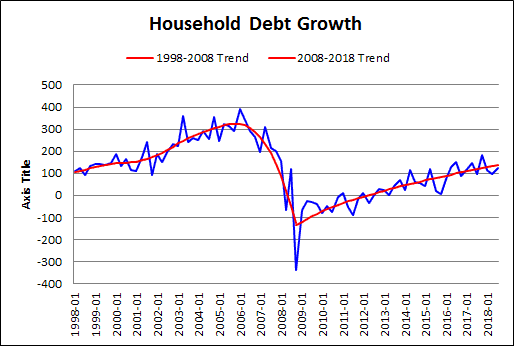Catch the drift? Recession, recession, recession.
Remember ten years ago? Nine years ago? Eight years ago?... Seven years ago? Remember all the predictions of raging inflation? I swear I thought those people wanted the raging inflation and were trying to talk the rest of us into somehow creating it.
Same thing now, except the prediction is recession. One idiot after another is predicting recession. And why? Because debt's been creeping up again? Because some unspecified category of home sales "plummeted" for a month? Or because so many people are predicting recession that Americans are "becoming more pessimistic about the economy"?
Empty arguments, all.
Just like the inflation predictions, the recession predictions have been popping up for some years now. They were getting on my nerves already two and a half years back, when I wrote Is anyone still predicting recession? Yes, in fact. (That time it was Larry Kudlow.) On my nerves again today while I was glancing at Reddit.
Hey, I dunno. Maybe we'll have a recession in 2019. Gosh, that's this year, isn't it. Wow. It's time for the recession predictors to update the catch-phrase and push the date out another year.
Like I was sayin, I don't know if we'll have a recession. We might.
Look with me:
 |
| Graph #1: Household Debt and H-P Trends |
Then there is a peak in the trend line in late 2005, a good two years before the start of the Great Recession.
There is no hint of flattening or peak in 2016 or 2017 or 2018. No sign of impending recession. It won't happen without warning.
Good thing I labeled that vertical axis, huh?

Employment:
 |
| Graph #2: Changes in Employment since Before World War Two |
Notice that the numbers slope downward toward zero before every recession. This provides a kind of early warning mechanism, a sign that tells us when a recession is likely.
Notice that the numbers show no downward slope at present.
Next graph, same data, only since 1982, with H-P trend lines:
 |
| Graph #3: Change in Employment and H-P Trends |
No downward slope at present. No indication of recession.

I don't know why I looked at household debt above. Habit I guess.
The Reddit link image refers to "$1.2 trillion in risky corporate debt". FRED doesn't have a category for "risky corporate debt". So I went back to Reddit and clicked the link:
Indebted borrowers increasingly take out high-interest, adjustable-rate loans that are packaged into securities and sold to investors eager for a better rate of return.They're NOT predicting recession. They're saying the debt's gonna be a problem when "the inevitable upcoming economic downturn" happens.
Everything’s fine while the economy is growing. But when it slows, those borrowers could default, causing problems to cascade through the financial system.
Hey. I agree: private debt is a problem. And I agree recession is "inevitable". But that doesn't mean recession will strike "by the end of 2019" or even by the end of 2020. If recession was imminent, we'd see it in the employment numbers. Or we'd see it in the slowing growth of debt. Or both. If you look in the right places you can tell if recession is on the way.
It isn't.



2 comments:
My take: The warnings of recession are "tiresome and unjustified".
Tim Duy says it better: Beware of a Recessionary Bias Among Analysts
Duy's bottom line:
"The anticipated economic slowdown in the months ahead will make for some interesting analysis as it will be easy to see a recession in every soft indicator. It is much more difficult to weigh the totality of the data flow, both good and bad. We should see an increase in “bad” data as the economy slows. Otherwise, the economy wouldn’t be slowing! We should also be careful to acknowledge our internal biases when making that that analysis..."
As of 18 April, the Endless Metrics Recession Indicator says no recession: "Right now, the model does not see a recession."
If you are reading this years from now, you need to know that recession fears are exceedingly high. I guess that's what my post was about.
Nice site, by the way: Endless Metrics.
Post a Comment